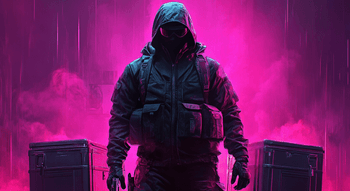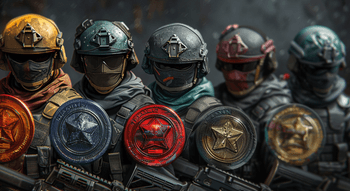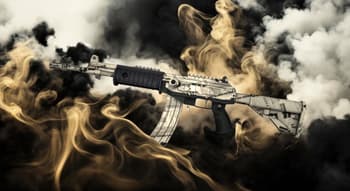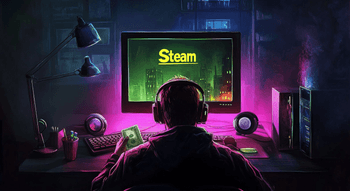CS2 Competitive vs Premier: Full Comparison
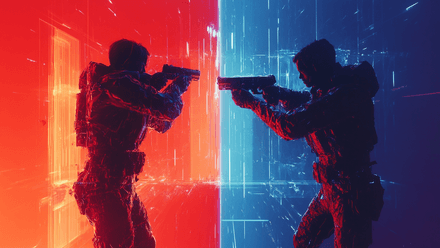
Counter-Strike 2 (CS2) offers a variety of game modes, CS2 Premier vs Competitive is probably the only battle that deserves your attention and truly matters. On the surface, these two modes appear nearly identical: They both follow classic 5v5 bomb-defusal gameplay with standard Counter-Strike 2 mechanics.
However, the CS2 Competitive vs Premier comparison has many subtle nuances that an average player might not be aware of. Understanding the difference between the two is especially relevant for newer players who might not be familiar with the map-choosing process, rating system, and overall competitiveness.
Whether you’re a newcomer to CS2 or a CS:GO veteran, this guide will help you understand the key differences between Premier and Competitive modes, which should help you pick the one that suits your goals and expectations better.
Competitive Mode Overview
New players or those with fresh accounts can’t access Competitive mode immediately. Even if you’ve purchased Prime status, you’ll first need to gain experience in Casual, Deathmatch, or Arms Race modes to unlock Competitive play.
Competitive mode in CS2, a continuation of CS:GO's Matchmaking, is a standard 5v5 using the MR12 format (first to win 13 rounds), ending in a 12–12 draw with no overtime. It uses the standard in-game economy with no pre-equipped items like armor or kits.
Accessible through the Matchmaking menu, the main difference between Premier and Competitive in CS2 lies in the number of battlefields. The latter includes maps from the Active Duty pool and adds community-made locations with even hostage-rescuing scenarios:
- Ancient;
- Anubis;
- Dust 2;
- Inferno;
- Mirage;
- Nuke;
- Train;
- Vertigo;
- Overpass;
- Jura;
- Grail;
- Agency;
- Office;
- Italy.
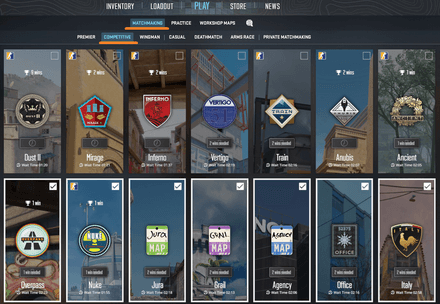
Competitive map pool
There’s no veto system, as you simply choose one or more maps and join. Competitive mode retains the classic 18‑rank ladder (Silver I → Global Elite), but now you earn a separate rank on each map and can achieve it after just two wins. Ranking up or down typically depends on a few consecutive matches, though strong individual performance is key and usually leads to faster climbs (or cushions losses).
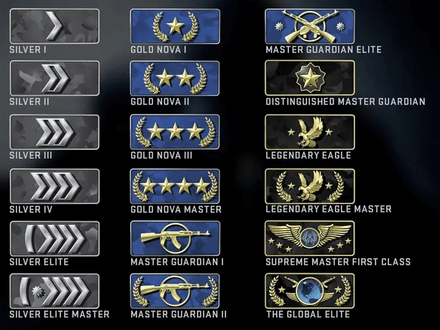
Overall, this mode is ideal for newcomers, casual players, or those without Prime status. Pros might still use it — especially to practice maps not included in Premier — but it mostly serves as a warm-up space and a learning ground before diving into the more serious Premier mode.
Premier Mode Overview
The Premier mode is one of the standout innovations in CS2, offering an ELO-based rankings and a pick-ban process that makes it feel much more like a professional setting. Moreover, it's accessible only to players with Prime status ($15), reinforcing the elite positioning. Of course, the Prime badge also unlocks weekly experience and tradable reward drops, which can be sold via Steam or other trading platforms, but the real draw to get it is access to Premier mode itself.
Another major difference between CS2 Premier Mode vs Competitive lies in the maps pool, which mirrors Valve’s official competitive lineup:
- Ancient;
- Anubis;
- Dust 2;
- Inferno;
- Mirage;
- Nuke;
- Train.
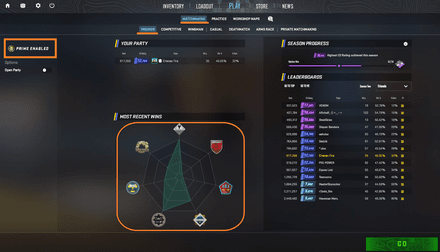
Premier Mode Menu & Maps
Moreover, in this pro-oriented mode, the players get a chance to veto a map they don’t like, which ensures a balanced map selection process and goes like this:
- Teams are randomly assigned as Team 1 and Team 2;
- Team 1 bans two maps;
- Team 2 bans three more;
- Team 1 picks the final map;
- Team 2 chooses the starting side.
The ranking system in Premier is more refined than Competitive’s. It features a public Leaderboard and seven rank divisions, each separated by 5,000-point — with Golden as the highest tier. Win/loss streaks have a greater impact than individual stats, putting a premium on team success. This is one of the main differences between CS Premier vs Competitive game modes.
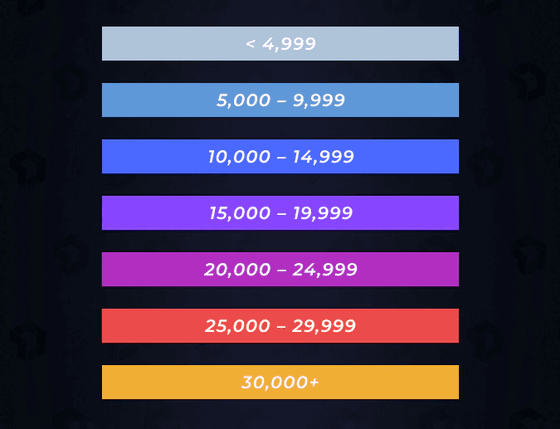
The renewed ELO system is presented in the form of a common table, where every player can compare themselves in the Global or Regional standing, and of course, against their friends. To receive an ELO rank, players must win 10 matches. After that, a player will see an estimate of the ELO gain/loss points before each match.
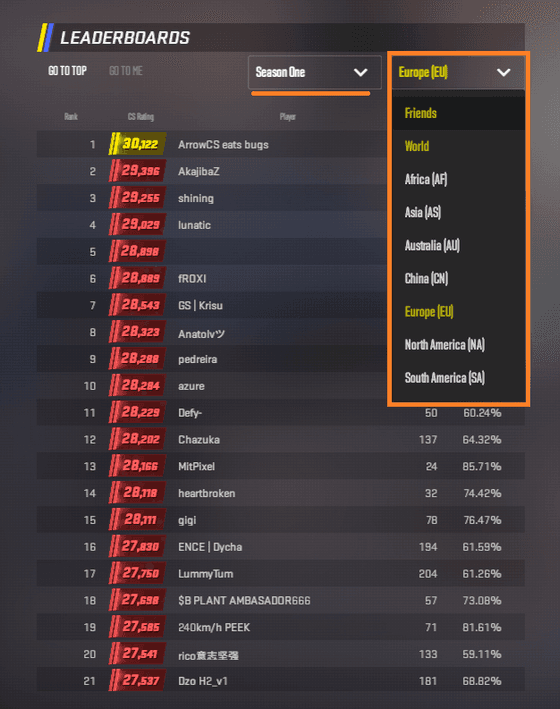
Those who want to know what's the difference between Premier and Competitive CS2 modes can quickly notice the contrast in the game. Premier is a pro-oriented mode, where the ranking system relies on the team results rather than solo stats, forcing players to at least attempt teamwork. Unsurprisingly, you should expect better teamplay, more coordination and a competitive atmosphere in Premier matches.
Differences Between CS2 Premier and Competitive Modes
Still wondering what's the difference between competitive and premier in CS2? Here’s a side-by-side breakdown of key differences and similarities between the two:
Feature | Competitive Mode | Premier Mode |
General Rules | Traditional 5v5 game with classic economy and round time | Traditional 5v5 game with classic economy and round time |
Access | Available to all players after gaining a few in-game ranks | For players with Prime status only, after reaching a few in-game ranks |
Map Pool | Active Duty maps, hostage rescue ones (Office, Italy), and rotating maps made by the community | Only Active Duty map pool, identical to the official tournaments |
Ranking | Traditional ranks from CS:GO (from Silver to Global Elite), individual for very map | Global ELO-based ranking system |
Map Selection | The lobby leader selects specific maps before queuing | Pick-and-ban process to determine the map and starting side |
Overtime Rules | No overtime | One overtime is available with a possible draw at a 15:15 |
Leaderboard | No leaderboard | Access to Regional, Global, and Friends leaderboards |
Game Mode Scenarios | Bomb-defusal and hostage-rescue maps | Only a bomb-defusal scenario |
Opponents | A wider player base, but usually unfiltered skill levels on the map | A more competitive approach, which levels the lobby ratings |
Cheaters/Smurfs | With no risk of getting a ban for a free account, it can involve cheaters and rarely smurfs | You can still encounter cheaters and smurfs, although the in-game anticheat is promised to be better for Primed players |
Penalties for Leaving the Match | 30-minute cooldown for the first time | 1,000 ELO points deduction plus 30-minute cooldown |
In our CS2 Premier vs FACEIT comparison, we’ve already compared the different ranking systems. Below is the approximate table of how Premier and Competitive ranks can be compared.
CS2 Premier Rank | CS2 Competitive Rank |
0-1k | Silver I |
1-2k | Silver II |
2-3k | Silver III |
3-4k | Silver IV |
4-5k | Silver Elite |
5-6k | Silver Elite Master |
6-7k | Gold Nova I |
7-8k | Gold Nova II |
8-9k | Gold Nova III |
9-10k | Gold Nova Master |
10-11k | Gold Nova Master |
11-12k | Master Guardian I |
12-13k | Master Guardian I |
13-14k | Master Guardian II |
14-15k | Master Guardian II |
15-16k | Master Guardian Elite |
16-17k | Master Guardian Elite |
17-18k | Distinguished Master Guardian |
18-19k | Distinguished Master Guardian |
19-20k | Legendary Eagle |
20-21k | Legendary Eagle |
21-22k | Supreme Master First Class |
22-23k | Supreme Master First Class |
23k+ | Global Elite |
Which Mode is Right for You?
Competitive Mode
The Competitive mode is ideal for beginners or those looking for a more relaxed experience. It doesn’t require purchasing Prime status, while learning basic game mechanics and strategies won’t be pressured by strict ranking rules. A player can also choose one or a few maps they want to play, without the need to learn all seven from the Active Duty pool. Overall, you can play it more relaxed and expect the same approach from opponents, but be ready to expect occasional imbalance in teams.
Premier Mode
With a pretty balanced ELO-based matchmaking and emphasis on teamplay, Premier is ideal to play with equal-level friends if you enjoy increased competitiveness. Here you can start building strategies right from the map banning process, while the personal stats don’t matter if your team loses. However, don’t be surprised by tough opposition, where smurfs and cheaters can quickly turn your joy into anger and disrupt games, so brace yourself for challenges.
Conclusion
At first glance, both Premier and Competitive modes are similar enough in terms of basic rules and overall in-game experience. However, the latter should be regarded as the entry point before you find enough friends, learn teamplay, hone basic skills, and be ready to climb a global leaderboard. Premier mode, in contrast, offers a polished, team-focused format that rewards communication, consistency, and coordination, where the individual level of play can go into the background of the team play and strategic thinking. If you're ready to climb the ladder and challenge yourself in a tournament-style setting, Premier is where you want to be.
